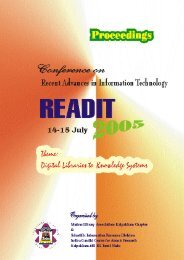READIT-2007 - Indira Gandhi Centre for Atomic Research
READIT-2007 - Indira Gandhi Centre for Atomic Research
READIT-2007 - Indira Gandhi Centre for Atomic Research
Create successful ePaper yourself
Turn your PDF publications into a flip-book with our unique Google optimized e-Paper software.
with EBR-II permanently and FFTF in a standby condition. Thus ef<strong>for</strong>t <strong>for</strong> fast reactor<br />
development essentially disappeared. Similarly, programmes in other nations were<br />
terminated or substantially reduced. In France, Superphenix was shutdown at the end of<br />
1998, SNR-300 in Germany was completed but not taken into operation, and KNK-II was<br />
permanently shutdown in 1991 (after 17 years of operation) and dismantled by 2004; in<br />
UK, PFR was shutdown I 1994, BN-350 in Kazakhstan was shutdown in 1998. Loss of<br />
the fast reactor knowledge should be taken seriously. The delay and economic impact of<br />
restoring the fast reactor option a few decades from now without the present knowledge<br />
would be enormous. By the time, all the facilities needed to generate the in<strong>for</strong>mation<br />
originally, and the people who possessed the knowledge would be long gone.<br />
Realising all these impediments on the knowledge on fast reactors, International<br />
<strong>Atomic</strong> Energy Agency (IAEA) has started an initiative to coordinate and facilitate the<br />
various national FRKP (Fast Reactor Knowledge Preservation) ef<strong>for</strong>ts. The objective of<br />
the initiative is to develop a Knowledge Base into which existing Knowledge<br />
Preservation System will fit, and which will complement and integrate future Member<br />
States’ ef<strong>for</strong>ts to preserve Fast Reactor Data and Knowledge. Its outcome will be an<br />
International Knowledge Base, widely used through a WWW-portal established and<br />
maintained by the Agency. The initiative relies on both IAEA and Member States<br />
contributions. The Agency contributes its own data and knowledge accumulated over<br />
more than 35 years of activities per<strong>for</strong>med within the framework of the TWG-FR<br />
(<strong>for</strong>merly known as IWG-FR). It will further create a FRKP network among the<br />
interested Member States, and will support and coordinate FRKP activities in the<br />
Member States [5].<br />
a) Role of the Agency<br />
Development of appropriate structure, methodology and guidance <strong>for</strong> fast<br />
reactor data retrieval and knowledge preservation, and providing it to the<br />
interested Member States<br />
Establishing pilot projects <strong>for</strong> retrieving and preserving fast reactor data and<br />
knowledge in critical areas and <strong>for</strong> endangered installations<br />
Facilitating partnership with other international organizations<br />
Providing, within the TWG-FR, a <strong>for</strong>um <strong>for</strong> exchange of best practices<br />
Integrating available in<strong>for</strong>mation resources into a knowledge system.<br />
5. KNOWLEDGE MANAGEMENT METHODS FOR TRANSFER AND<br />
PRESERVATION<br />
The safe, reliable and cost-effective operations of FBTR require that personnel<br />
possess and maintain the requisite knowledge, skills, and attitudes to do better job. This<br />
includes not only the technical competencies required by the nature of the technology and<br />
particular engineering designs, but also the “softer” competencies associated with the<br />
effective management, communication and teamwork. Traditional worker training<br />
programmes have addressed ‘explicit knowledge’ that is contained in written documents,<br />
policies and procedures. However, ‘tacit knowledge’ that is held in a person’s mind has<br />
not typically been either captured or transferred in any <strong>for</strong>mal manner. Rather, new<br />
workers have acquired such knowledge over time through their working with those who<br />
183

















